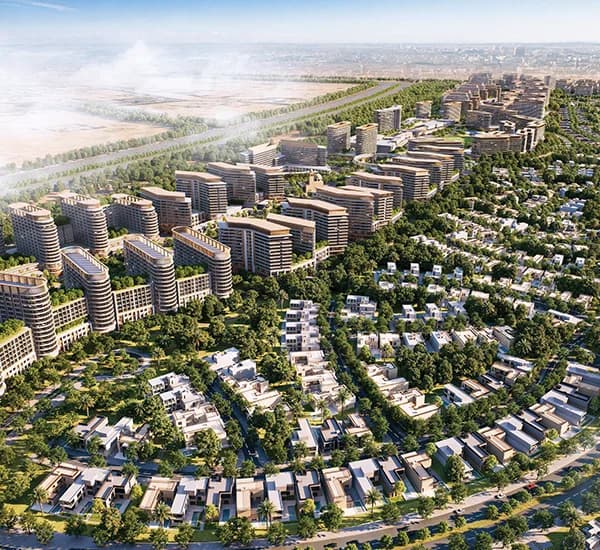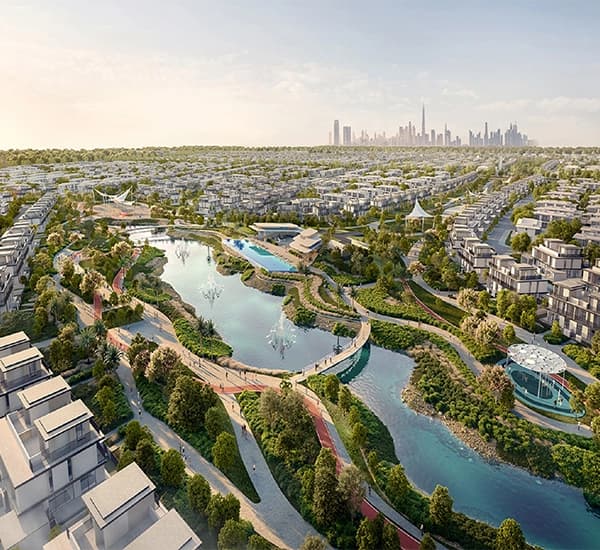Invest in Dubai or India Because of This: -
- Invest in Dubai for: High, stable, tax-free yields, a secure, dollar-pegged currency, a transparent process for foreign owners, and a luxury market focused on capital appreciation
- Invest in India for: High long-term capital growth, leveraging a massive domestic demand story, demographic dividends, and investing in a rapidly maturing economy with immense future potential
The 25-Point Data-Driven Comparison (Dubai Vs. India)
| Factor | Dubai (UAE) | India | The Verdict & Key Insight |
|---|---|---|---|
| 1. Rental Yield (Avg.) | 6% - 8% (One of the highest globally) | 2% - 4% (In major metros like Mumbai, Delhi) | Dubai wins on cash flow. Yields are significantly higher, making it ideal for passive income. |
| 2. Capital Appreciation (2023-24) | ~15% - 20% (Post-pandemic surge) | 5% - 10% (Varies highly by city and project) | Dubai leads recently, but India's growth is steady and based on fundamental demand. |
| 3. Currency | UAE Dirham (AED) Pegged to USD | Indian Rupee (INR) (Floating, can be volatile) | Dubai wins on stability. A USD-pegged asset protects against INR depreciation for foreign investors. |
| 4. Foreign Ownership | Freehold ownership in designated areas. 100% foreign ownership is now common. | Complex. Not all property types/cities allow direct freehold. Often requires long-term leases. | Dubai wins on ease. The process is explicitly designed for international buyers. |
| 5. Investment Visa | Yes. Property investment of ~AED 2M+ grants a 2-year renewable residency visa. | No direct path. Property investment does not automatically qualify for residency. | Dubai wins. A major draw for investors seeking relocation or a second home base. |
| 6. Transaction Costs | ~6-8% (Includes 4% DLD fee + agent commission) | ~5-10% (Stamp duty, registration, GST - varies by state) | Slight edge to India in some states, but Dubai's transparency reduces hidden costs. |
| 7. Property Tax | 0% (There is no annual property tax) | Municipal Taxes (Low) + Potential Vacant Land Tax in some states. | Dubai is the clear winner. The absence of annual tax is a massive financial advantage. |
| 8. Income Tax on Rent | 0% (No personal income tax on rental earnings) | Taxable. Added to your income slab, can be up to 30%+ | Dubai wins overwhelmingly. This drastically boosts net rental yield. |
| 9. Capital Gains Tax | 0% (No tax on profits from property sale) | 20% (With indexation benefits on long-term gains) | Dubai wins. Keeping 100% of your capital gains is a powerful incentive. |
| 10. Inheritance Laws | Based on property location & owner's nationality. Can use Dubai courts or home country wills. | Governed by Indian succession laws, which can be complex for foreigners. | Dubai is more flexible for international investors with clear will registration processes. |
| 11. Market Maturity | Mature, regulated, and transparent. Governed by DLD (Dubai Land Department). | Developing and maturing rapidly. RERA has brought transparency but implementation varies. | Dubai wins on predictability. Established laws reduce investor risk. |
| 12. Market Liquidity | High. High investor turnover, especially in prime areas. Easy to enter and exit. | Moderate to Low. Real estate is still a relatively illiquid asset class in India. | Dubai wins. The ability to quickly sell an asset is a key advantage. |
| 13. Primary Demand Driver | Foreign Investment & Tourism (Expatriates, investors, second-home buyers) | Domestic Demand (Urbanization, rising income, nuclear families) | India's demand is more organic, while Dubai's is more global and cyclical. |
| 14. Infrastructure Quality | World-Class. Cutting-edge roads, airports, metros, and utilities. | Improving rapidly but inconsistent. Major metros have good infra, others are developing. | Dubai wins on current quality. India wins on the scale of future infrastructure projects. |
| 15. Political Stability | Very High. A stable, predictable government pro-business environment. | Stable. The world's largest democracy with a pro-reform government. | Both are stable, but Dubai's absolute monarchy offers policy consistency. |
| 16. Economic Growth | Diversifying. Steady growth tied to oil, tourism, trade, and real estate. | Rapid. One of the fastest-growing major economies (~7% GDP growth). | India wins on growth potential. Its economic scale and trajectory are unmatched. |
| 17. Demographic Advantage | Limited. Reliant on expat influx. Population ~3.6 million. | Massive. 1.4+ billion people with a growing middle class. Median age ~28 years. | India is the undisputed winner. Demographics are destiny in real estate. |
| 18. Transparency (JLL Index) | Transparent (Consistently ranks high in global real estate transparency indices) | Semi-Transparent (Improving significantly with RERA, GST, and REITs) | Dubai is more transparent, but India is closing the gap fast. |
| 19. Regulatory Body | Dubai Land Department (DLD) - Highly efficient and digital. | RERA (Real Estate Regulatory Authority) - Powerful on paper, but state-level implementation varies. | Dubai's DLD is a benchmark for efficiency and digital governance. |
| 20. Best For (Investment Type) | Luxury Assets, Passive Income, Portfolio Diversification, Safe-Haven Asset | Long-Term Capital Growth, Land Banking, Development Projects, Serving Domestic Demand | It depends on your goal. Cash flow vs. long-term growth. |
21. Risk Profile | Medium. Exposure to global economic cycles and oil prices. | Medium-High. Regulatory changes, execution risk, and local market volatility.
22. Entry Point Cost | High. Quality assets in good locations require significant capital. | Wide Range. Options available range from very affordable to ultra-luxury.
23. Popular Investment Cities | Dubai Marina, Downtown, Palm Jumeirah, Emaar South | Mumbai, Bengaluru, Delhi-NCR, Hyderabad, Pune
24. Future Catalysts | Dubai 2040 Urban Master Plan, D33 Economic Agenda, Expo Legacy | Infrastructure push (Highways, Bullet Train), PMAY, Industrial Corridors
25. Ease of Doing Business | Extremely High. Ranked among the best globally because of its flexibility. | Improving. Significant reforms have eased processes for developers and investors.
Not just about the current scenario, but what these places are doing to serve their population to make their living better and add opportunity is one of the key comparisons that will bring the right matrix of investment in Dubai or India, so here we go: -
The Future Outlook: What these areas are planning to comfort their population
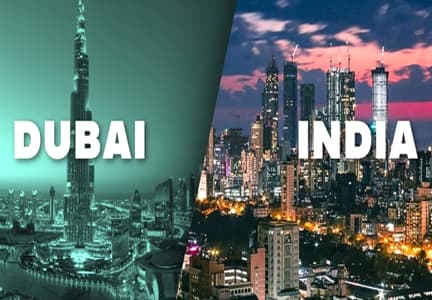

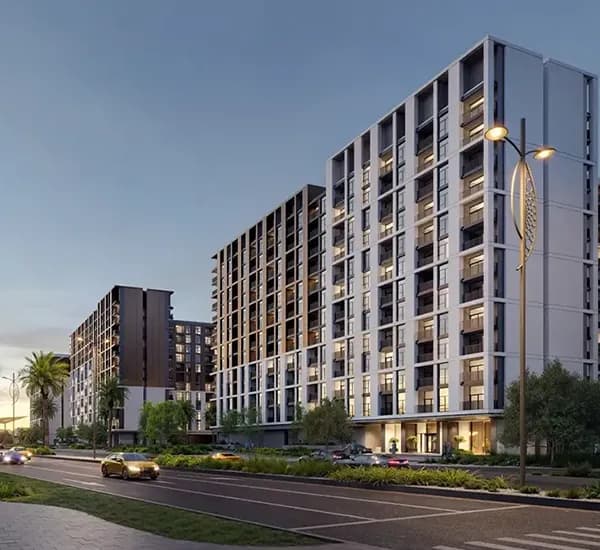



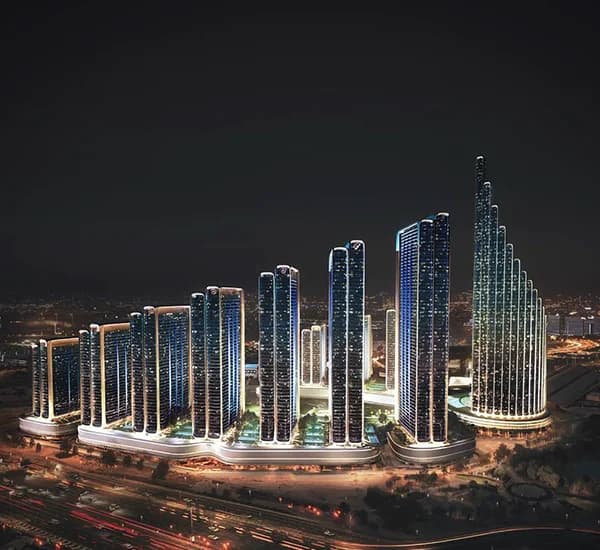
.svg)
